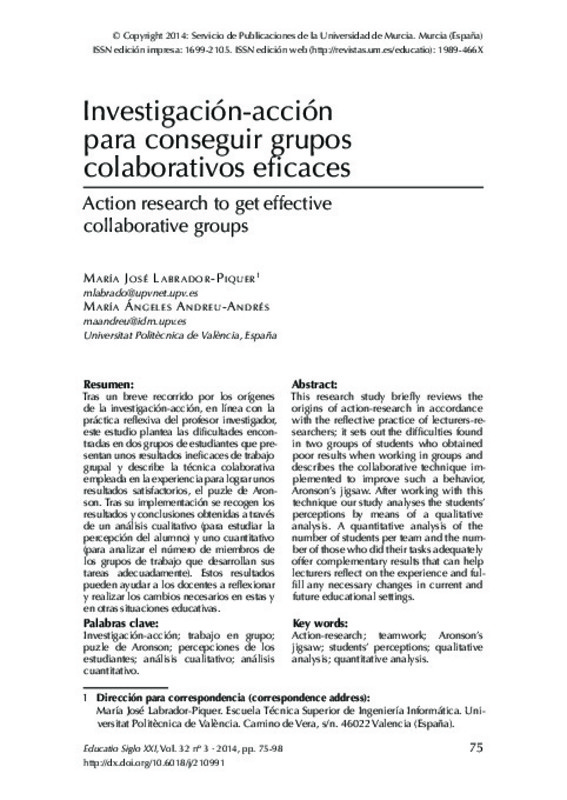JavaScript is disabled for your browser. Some features of this site may not work without it.
Buscar en RiuNet
Listar
Mi cuenta
Estadísticas
Ayuda RiuNet
Admin. UPV
Investigación-acción para conseguir grupos colaborativos eficaces
Mostrar el registro sencillo del ítem
Ficheros en el ítem
| dc.contributor.author | Labrador Piquer, María José
|
es_ES |
| dc.contributor.author | Andreu Andrés, María Angeles
|
es_ES |
| dc.date.accessioned | 2016-04-21T10:39:14Z | |
| dc.date.available | 2016-04-21T10:39:14Z | |
| dc.date.issued | 2014 | |
| dc.identifier.issn | 1699-2105 | |
| dc.identifier.uri | http://hdl.handle.net/10251/62795 | |
| dc.description.abstract | [EN] This research study briefly reviews the origins of action-research in accordance with the reflective practice of lecturers-researchers; it sets out the difficulties found in two groups of students who obtained poor results when working in groups and describes the collaborative technique implemented to improve such a behavior, Aronson’s jigsaw. After working with this technique our study analyses the students’ perceptions by means of a qualitative analysis. A quantitative analysis of the number of students per team and the number of those who did their tasks adequately offer complementary results that can help lecturers reflect on the experience and fulfill any necessary changes in current and future educational settings. | es_ES |
| dc.description.abstract | [ES] Tras un breve recorrido por los orígenes de la investigación-acción, en línea con la práctica reflexiva del profesor investigador, este estudio plantea las dificultades encontradas en dos grupos de estudiantes que presentan unos resultados ineficaces de trabajo grupal y describe la técnica colaborativa empleada en la experiencia para lograr unos resultados satisfactorios, el puzle de Aronson. Tras su implementación se recogen los resultados y conclusiones obtenidas a través de un análisis cualitativo (para estudiar la percepción del alumno) y uno cuantitativo (para analizar el número de miembros de los grupos de trabajo que desarrollan sus tareas adecuadamente). Estos resultados pueden ayudar a los docentes a reflexionar y realizar los cambios necesarios en estas y en otras situaciones educativas. | es_ES |
| dc.language | Español | es_ES |
| dc.publisher | Universidad de Murcia | es_ES |
| dc.relation.ispartof | Educatio Siglo XXI | es_ES |
| dc.rights | Reconocimiento - No comercial - Sin obra derivada (by-nc-nd) | es_ES |
| dc.subject | Teamwork | es_ES |
| dc.subject | Action-research | es_ES |
| dc.subject | Aronson’s jigsaw | es_ES |
| dc.subject | Students’ perceptions | es_ES |
| dc.subject | Qualitative Analysis | es_ES |
| dc.subject | Quantitative analysis | es_ES |
| dc.subject | Investigación-acción | es_ES |
| dc.subject | Trabajo en grupo | es_ES |
| dc.subject | Puzle de Aronson | es_ES |
| dc.subject | Percepciones de los estudiantes | es_ES |
| dc.subject | Análisis cualitativo | es_ES |
| dc.subject | Análisis cuantitativo | es_ES |
| dc.subject.classification | FILOLOGIA ESPAÑOLA | es_ES |
| dc.subject.classification | LENGUA ESPAÑOLA | es_ES |
| dc.subject.classification | FILOLOGIA INGLESA | es_ES |
| dc.title | Investigación-acción para conseguir grupos colaborativos eficaces | es_ES |
| dc.type | Artículo | es_ES |
| dc.identifier.doi | 10.6018/j/210991 | |
| dc.rights.accessRights | Abierto | es_ES |
| dc.contributor.affiliation | Universitat Politècnica de València. Departamento de Lingüística Aplicada - Departament de Lingüística Aplicada | es_ES |
| dc.description.bibliographicCitation | Labrador Piquer, MJ.; Andreu Andrés, MA. (2014). Investigación-acción para conseguir grupos colaborativos eficaces. Educatio Siglo XXI. 32(3):75-98. doi:10.6018/j/210991 | es_ES |
| dc.description.accrualMethod | S | es_ES |
| dc.description.upvformatpinicio | 75 | es_ES |
| dc.description.upvformatpfin | 98 | es_ES |
| dc.type.version | info:eu-repo/semantics/publishedVersion | es_ES |
| dc.description.volume | 32 | es_ES |
| dc.description.issue | 3 | es_ES |
| dc.relation.senia | 279325 | es_ES |








